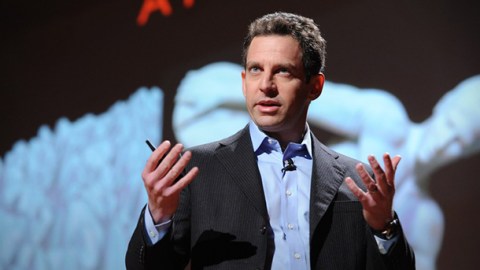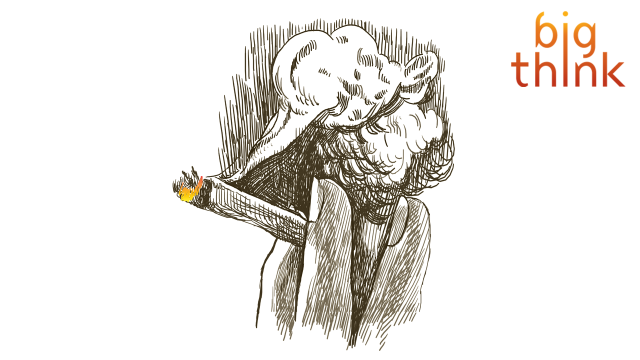Sam Harris Wakes Up

One day while walking through Rutgers’ Quad Two on the way to the gym, I noticed my friend Shelton across the lawn. As he bounced along the sidewalk—he was in constant point guard mode—it appeared that he was talking. This was 1994, well before the possibility of a headset bluetoothed to his cell phone. I yelled out inquiring who he was addressing.
‘Myself!’ he immediately shot back. ‘Don’t got no one else to talk to right now.’ And he bounded along with an invisible crossover.
At the moment his statement made perfect sense. We’re always talking to ourselves in our head. Shelton simply moved the inside voice outside, much to his delight, even if it confounded those he passed by.
Neuroscientist and author Sam Harris uses this internal dialogue when contemplating consciousness in his book, Waking Up: A Guide to Spirituality Without Religion. He uses the example of someone finding their keys after a brief displacement. How often do we say, aloud, yet to ourselves, ‘Oh there they are!’ Who, exactly, are we talking to?
The dialogue—two competing monologues in one head—usually concludes at that point, at least verbally. The mind chatter continues. If someone were to elaborate on just exactly how stupid one is for misplacing their keys, then you might start to wonder about their sanity, even though most of us have the exact same conversation in silence.
Harris, who made his mark as an atheist thinker (even though, as he has pointed out, he never once wrote the word in his breakthrough debut, The End of Faith), meditates here on his numerous years as an inquisitive seeker spending weeks and months on silent retreats. Just as he broke ground when suggesting that societies can investigate ethics from a neural perspective in The Moral Landscape, in Waking Up he tackles the notion of developing spirituality sans religion, another topic certain to raise some eyebrows.
That very notion was the basis of this column when I began writing it two years ago. In that time I’ve received criticism from similar camps as Harris describes. Yoga instructors have a hard time believing I’m among them as an atheist, while those who favor rationality have, at times, immediately written off my ideas because I happen to teach yoga (disregarding my former career in journalism).
Is spirituality possible without a deity? Of course. But you must be willing to question previously held beliefs—or at the very least honestly investigate the topic you deride—for that to be understood and, perhaps more importantly, implemented, for in this domain actions matter most. Who you are is defined by how you are. Sometimes we forget that.
Beyond Harris’ explanation of the illusion of self here, what interested me most in Waking Up was his detailed knowledge of the process of thinking itself. As he writes,
Thinking is the basis of every social relationship we have. It is also the foundation of science. But our habitual identification with thought—that is, our failure to recognize thoughts as thoughts, as appearances in consciousness—is a primary source of human suffering. It also gives rise to the illusion that a separate self is living inside one’s head.
This, he proposes, is perhaps the hardest thing a human being can do: understand a thought as a thought. Shelton was just verbally expressing what our brains are doing every moment of every day. Harris continues,
It is not within our power to simply stop talking to ourselves, whatever the stakes. It’s not even in our power to recognize each thought as it arises in consciousness without getting distracted every few seconds by one of them. Without significant training in meditation, remaining aware—of anything—for a full minute is just not in the cards.
Harris plunges into Buddhist inquiry: thinking creates suffering. Buddha considered all life dukkha. Usually translated as ‘suffering,’ others, such as religious scholar Karen Armstrong and psychotherapist Mark Epstein understand it as ‘flawed’ and ‘unsatisfactory.’ It is our brain, a perpetual thought-making machine, desiring that the world should be this way. When it’s not (and it’s inevitable that it won’t be), we suffer because we considered our thoughts to be the true marker of what reality is.
Unlike the surge in universalist religious principles, Harris dispels the popular New Age notion that ‘all religions are saying the same thing.’ This is a lack of critical thought, not a feature of the world’s faiths. Religious ideologies are incompatible for they are feeding our evolutionary tribal nature, our yearning for the in-group. Thinking that any religion is the ‘one’ leads to delusional philosophies and, sadly, actions.
Meditation cuts through that illusion. By contemplating the self, the core of introspective practices worldwide, you recognize the very nature of the self as illusory. While having your perceived identity stripped bare sounds frightening, there is a genuine freedom at the heart of this practice. It absolves us of the necessity of filling every moment with stuff, leading to our varied addictions—most notably the incessant checking of a phone every few moments in order to feel ‘connected.’
As Harris suggests, don’t take any of this at face value. Try for yourself. My favorite line is when he calls meditation the space between dullness and agitation. Both are impossible to escape when beginning a seated practice: the sheer boredom of ‘doing nothing’ or the surge of anxiety that accompanies the feeling that there’s so much else to be done right now, this is stupid, why am I just sitting here.
Yet our brain is never really doing nothing. Besides keeping the body in homeostasis, it’s doing what it does all the time: thinking. While we might not know the origins of this process, we do know its effects. And if we want to change how that process operates, we need to still the muddied waters of our thoughts. No deities, no angels, no prophets can offer a thing in this regard. It’s just you and your brain coming to terms that they’re the same process of being, and every tiny facet of your reality hinges on this fact.





